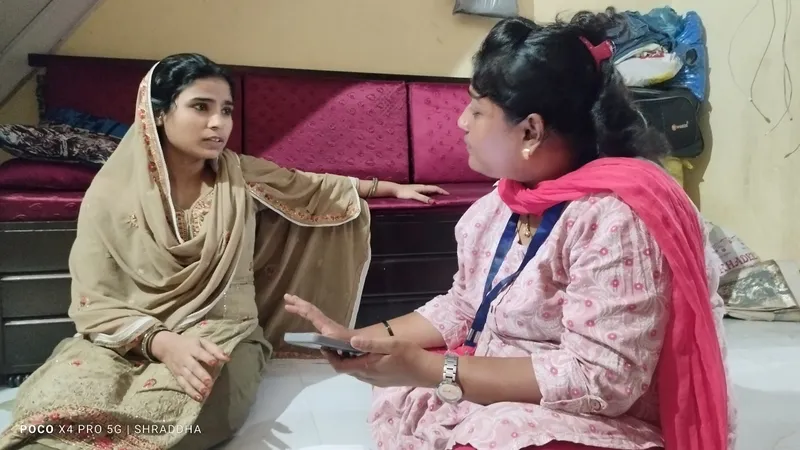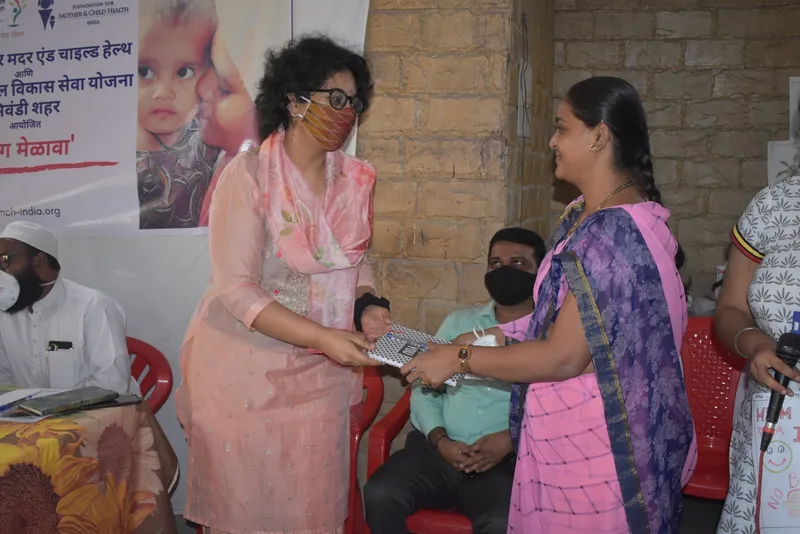Foundation for Mother and Child Health is working towards preventing malnutrition in vulnerable communities
This non-profit organisation works with vulnerable families in different regions on maternal health and malnutrition.
Shruthi Ranganath Iyer, a qualified engineer, worked with Infosys after completing her engineering degree, but she found her calling in the social sector when she joined the Teach for India Fellowship in 2009.
After completing the fellowship, she worked with a few educational organisations such as Hippocampus Learning and Samhita Academy till 2016, focusing on implementation until she was selected as an Acumen Fellow, a leadership programme for social innovators in 2016.

A counselling session in progress
“When the social sector opened up for me, I started defining for myself why I do what I do. And a big part of it is ensuring that women everywhere have a choice, voice and agency. So, from a very reluctant feminist, I became a very proud one,” she tells SocialStory.
Iyer ran Mentor Me India, a non-profit mentoring organisation between 2016 and 2019 in Mumbai. In April 2019, she joined Foundation for Mother and Child Health (FCMH) as its CEO, and, in the following year, she transitioned to the role of co-founder.
“At the time, FMCH was a small organisation, a 20-member team with a clinical model focused on maternal and child health. Initially, there would be a doctor and a nutritionist going out into the community or treating the women who visited our centre,” she says.
But soon she realised her heart lay at the intersection of solving gender-related problems at scale using technology.
Malnutrition is preventable

Shruthi (left) at an event
According to the findings of the POSHAN tracker (a job aid for the anganwadi worker) released by the Government of India in 2023, there are over 14 lakh severely malnourished children in the country.
FMCH believes about 50 to 70% malnutrition is preventable, and interventions during the first 1000 days of a child’s life can help sustainably manage the burden through preventive nutrition.
“This starts from the time the woman is pregnant till the baby is two years old—she needs to know about her IFA tablets (health supplement), ANC (antenatal care) visits … A lactating mother needs to know how to breastfeed and, when the child is six months old, how to start complementary feeding. All this together will result in prevention of malnutrition for the mother and child,” she elaborates.
FMCH has trained 100 frontline workers so far. It also partners with governments to train its frontline workers and give them the technology and tools to deliver the right kind of services to mothers.
In its direct intervention initiative, Poshan focuses on early detection of urban slum population in the Jarimari area of Kurla in Mumbai. FMCH has identified and trained women from the local communities in the area to counsel mothers and families with children on the right health and nutritional practices in the first 1000 days after childbirth using its tech tool–the NuTree app.
Using the app, the frontline worker has access to all the information on the family she needs to counsel and the kind of counselling that has to be given. Biomarker indicators and behaviour change data is also collected as part of the process. The frontline workers also organise awareness sessions on proper eating and feeding practices during pregnancy.
Another key initiative of FMCH is the Anganwadi Accelerator Programme where it works with the Women and Child Development Department in Chhatarpur and Raigarh in Madhya Pradesh, Kurla in Maharashtra, and Tumkur in Karnataka.
Explaining the process, Iyer says, “The frontline workers identify families who are in the first 1,000 days of a child’s life. They go out there and collect data about the women—who are malnourished, who’s at high risk, is there domestic violence in the communities, and based on the information collected, they counsel the families. The fourth most important task is to consistently follow up until the child is two years old.”
There are three main challenges on the ground.
“One is the lack of information around nutrition. Junk food has become so accessible and aspirational that even the poor land up having a lot of junk food.
“The second is that most women don’t have the agency at home to make decisions about food.
“Also, the government system is so burdened that there are not enough people who are supposed to provide vital information on nutrition,” she explains.
The foundation has a special app for government frontline workers called NutriLite and a chatbot that mothers can use for nutritional counselling.
FMCH has so far impacted 3 lakh families across the locations it works in. It raises money for its initiatives from donors and CSR funds.
Going forward, the organisation is looking to expand its direct model and identify
more women from the communities and train them to become leaders in high malnutrition areas in the urban slums of Mumbai and Bengaluru.
“We also want to provide the three Ts–right training, tools, and data tracking–to the Anganwadi worker to help her solve malnutrition in her communities. We want to advocate for and scale in various other locations in MP and Karnataka,” she adds.
Edited by Megha Reddy






